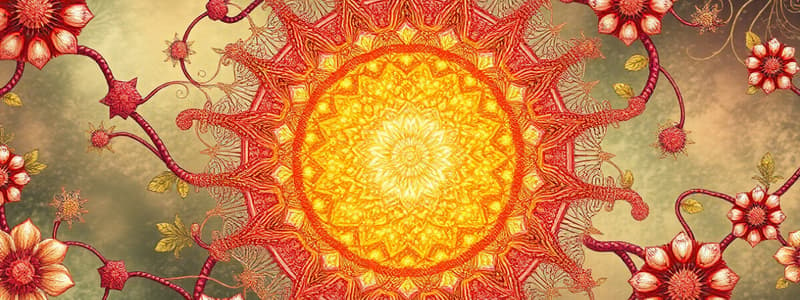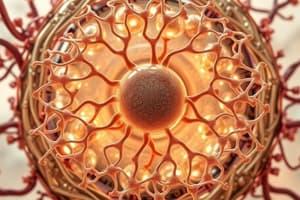Podcast
Questions and Answers
Who was the first to observe single-celled organisms, which he called 'animalcules'?
Who was the first to observe single-celled organisms, which he called 'animalcules'?
- Anton Van Leeuwenhoek (correct)
- Robert Brown
- Matthias Schleiden
- Robert Hooke
Whose work challenged the idea of spontaneous generation, suggesting that cells arise from pre-existing cells?
Whose work challenged the idea of spontaneous generation, suggesting that cells arise from pre-existing cells?
- Robert Hooke
- Anton Van Leeuwenhoek
- Theodore Schwann
- Rudolph Virchow (correct)
Which scientist's discovery contributed to the understanding that cells are the fundamental building blocks of plants?
Which scientist's discovery contributed to the understanding that cells are the fundamental building blocks of plants?
- Matthias Schleiden (correct)
- Robert Hooke
- Anton Van Leeuwenhoek
- Robert Brown
Which of the following statements is NOT a key principle of the Cell Theory?
Which of the following statements is NOT a key principle of the Cell Theory?
What did Robert Hooke observe when he coined the term 'cell'?
What did Robert Hooke observe when he coined the term 'cell'?
Which scientist is credited with the discovery of the nucleus?
Which scientist is credited with the discovery of the nucleus?
What is the hierarchical organization of living organisms, starting from the most basic unit?
What is the hierarchical organization of living organisms, starting from the most basic unit?
Flashcards
Who coined the term 'cell'?
Who coined the term 'cell'?
Robert Hooke was an English scientist who first discovered and described cells using a microscope in 1660.
Who discovered microscopic organisms?
Who discovered microscopic organisms?
Anton Van Leeuwenhoek was a Dutch scientist who built over 500 microscopes and was the first to observe single-celled organisms, which he called 'animalcules.'
Who named the 'nucleus'?
Who named the 'nucleus'?
Robert Brown was a Scottish physician who first used the term 'nucleus' to describe the central part of a cell in the 1830s.
Who discovered the importance of cells in plants?
Who discovered the importance of cells in plants?
Signup and view all the flashcards
Who connected plant and animal cells?
Who connected plant and animal cells?
Signup and view all the flashcards
Who proposed the concept of 'all cells come from pre-existing cells'?
Who proposed the concept of 'all cells come from pre-existing cells'?
Signup and view all the flashcards
What is the Cell Theory?
What is the Cell Theory?
Signup and view all the flashcards
Study Notes
Cell Theory Pioneers
- Robert Hooke: English scientist who first used the term "cell" to describe cells, discovered this while examining cork in 1660.
- Anton van Leeuwenhoek: Dutch scientist, major contributor to microscopy, built over 500 microscopes in his lifetime. Observed single-celled organisms ("animalcules") but failed to observe how they reproduced.
- Robert Brown: Scottish physician, in the 1830s, first used the term nucleus.
- Mathias Schleiden: Noted that cells are the fundamental units of plants.
- Theodore Schwann: Compared animal cells to plant cells.
- Rudolf Virchow: Stated that all cells come from pre-existing cells, challenging the theory of spontaneous generation, and described cell formation from the inside out.
Cell Theory
- Cells: fundamental unit of all life.
- All living organisms composed of one or more cells.
- Cells are the smallest unit exhibiting the characteristics of life.
- Cells originate from pre-existing cells.
Studying That Suits You
Use AI to generate personalized quizzes and flashcards to suit your learning preferences.



